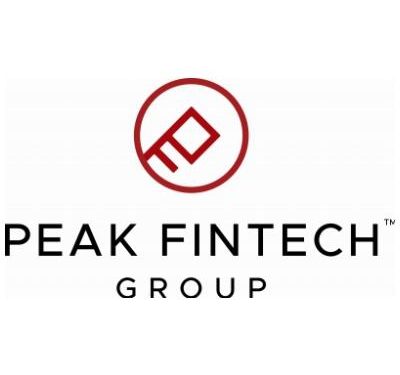Fintech
Peak 2020 Revenues Top $40M in Audited Year-End Financial Results

Montreal, Quebec–(Newsfile Corp. – April 30, 2021) – Peak Fintech Group Inc. (CSE: PKK) (“Peak” or the “Company”) today announced its financial results for the year ended December 31, 2020. The Company reported revenue in excess of $40M for the year, in line with what it had forecasted, despite some headwind from the COVID-19 pandemic during the year. All amounts expressed are in Canadian dollars.
2020 Financial Highlights:
-
Total Revenue of $42.7M
-
Adjusted EBITDA of ($1.86M)
-
Net Loss of ($5.51M)
Comparative Summary of Key Financial Metrics from 2018 to 2020
| 2020 | 2019 | 2018 | |
| Revenue | $42,698,047 | $11,708,653 | $1,681,534 |
| Expenses1 | $44,556,226 | $10,173,036 | $3,260,765 |
| Adjusted EBITDA2 | ($1,858,179) | $1,535,617 | ($1,579,231) |
| Net Income (Loss) | ($5,513,511) | ($1,830,361) | ($3,608,920) |
1 Expenses do not include interest, taxes, depreciation (including impairment of intangible assets) loss on settlement of debt, gain on bargain purchase and amortization
2 Adjusted EBITDA equals net income (loss) before finance costs, taxes, depreciation, amortization and impairment of intangible assets, loss on extinction of debt, gain on bargain purchase and amortization
2020 Operating Highlights:
-
Expansion of operations to Shanghai commercial credit market
-
Partnership to help distribute COVID-19 financial aid from Jiangyin municipal government to city’s affected businesses
-
Addition of several new Jinxiaoer Service Centres, including in the cities of Changzhou, Suzhou, Nanjing and Taiyuan
-
Addition of several new lenders to the Lending Hub, bringing the number of banks and lending institutions in the ecosystem to more than 50
-
Integration of the Jinxiaoer loan brokerage platform to the Lending Hub ecosystem
-
Equipment financing program powered by Cubeler Lending Hub in Xi’An
-
Launch of government-backed commercial lending Financial Centre powered by Cubeler Lending Hub in Jiangyin
-
Beginning of transition of certain previously outsourced supply-chain financing related services to Gold River 2.0 platform
Review of 2020
As it was for most companies all over the world, 2020 began with a lot of uncertainty for Peak due to COVID-19. However, as the Chinese government sought to get the economy re-started through various credit initiatives, the Company was able to play a role in the distribution of some government financial aid programs and ride some of those initiatives to have a strong finish to the first quarter. COVID-19 restrictions began easing in Q2, which helped the Company gain some footing in the quarter. Peak ramped up its services in the supply-chain vertical by expanding its offering to the cities of Changzhou and Suzhou during the quarter. This, along with the successful integration of the Jinxiaoer loan brokerage platform to the Company’s Lending Hub, resulted in a considerable increase in the number of transactions facilitated by the Hub in Q2.
Demand for Peak’s services reached new levels in the third quarter, which helped the Company post record revenues. The vast majority of Peak’s revenue was still being generated by facilitating supply-chain related purchase orders between raw material suppliers and manufacturers, but the Company slowly began to work its way down the transactional supply-chain toward its objective of eventually finance purchase orders placed with thousands of manufacturers and distributors by tens of thousands of retailers.
The fourth quarter of 2020 provided validation that the Company’s client acquisition strategy of providing services to raw material suppliers and large factories to get to their thousands of distributors and retail clients was working. That strategy led to partnerships with consumer electronics distributor Beijing Dianjing Company Ltd. (“BDC”), and packaged foods product distributor Beijing Jingying Corporate Management Ltd., who collectively have over 310,000 small business retailer clients with the potential to become members of the Peak’s Lending Hub ecosystem. Peak also leverage its relationship with the supply-chain to build a network of more than 55,000 social media influencers that have become a force in China’s retail industry. Considering that Peak’s Lending Hub ecosystem in 2020 included a total of approximately 30,000 micro, small and medium sized business clients, Q4 2020 was so far the most important quarter for the Company in terms of future revenue potential since it first deployed the Lending Hub in the second quarter of 2018.
Peak also began to see some of the higher profit margin transactions it believes are the future of the Company in the fourth quarter, including transactions where the Lending Hub is used to help social media influencers finance product showcase events on popular social media platforms such as TikTok and WeChat. These types of transactions are expected to account for an increasingly greater percentage of transactions on Lending Hub, thereby gradually improving the Company’s overall profit margin. Peak was also able to improve the profit margins of its supply-chain financing service bundle and realize important savings on cost of service expenses during the quarter as more and more supply-chain financing related services previously outsourced to third-parties were shifted to the Company’s Gold River platform.
As it has done for the past couple of years, Peak spent time during the last quarter of the year paying special attention to ensuring that its platforms remain at the forefront of the analytics and AI spectrum of the Fintech space. The Company completed the integration of China’s new digital currency to its platforms in the quarter, making Peak’s Lending Hub and Gold River platforms among the first at the time to provide clients with the ability to conduct digital RMB transactions. The Company also saw an opportunity to enhance its Lending Hub offering to small, local and regional banks, while adding a complementary data set to Lending Hub that would enhance the platform’s AI capabilities, and signed a letter of intent to acquire banking AI software company Zhongke Software Intelligence Ltd (“Zhongke”), whose software was being used by 34 banks and financial institutions at the time of the signing of the agreement.
The Company’s capital markets strategy in Q4 picked up where it left off in Q3. Peak continued to work with its strategy advisors and consultants to structure the Company and take steps to prepare it to list its securities on top-tier stock exchanges such as the NASDAQ. Peak’s capital market success came at a considerable cost, as “consulting fees” were second only to “cost of service” expenses related to supply-chain transactions in Q4 and for all of 2020. The high consulting fees incurred by the Company in 2020 however were related to specific capital market strategies designed and implemented primarily in Q3 and Q4. Those fees are therefore not expected to account for such a large percentage of the Company’s expenses in the future.
Outlook for 2021
Peak closed out the last quarter of 2020 finding itself in the best position it’s ever been from all relevant aspects of its business. The Company finished the year having generated almost 4 times more revenue than it did in 2019, was showing a strong balance sheet featuring almost $6M in cash and virtually no long-term debt and had strategic partnerships in place to potentially add more than 10-times the number of clients the Company serviced throughout 2020. This puts Peak in position for what management expects to be an exceptional year in 2021 in terms of number of clients serviced, geographic expansion and revenue generated, which should culminate into the Company’s first profitable year.
Peak is a strong believer in the power of China’s social media platforms and the influencers that are using those platforms to reshape the country’s retail industry. These influencers create, host and put on elaborate product showcase events on popular platforms such as TikTok, Weibo and WeChat where millions of dollars’ worth of merchandize is purchased by their millions of followers at each event. Peak created a program on its Lending Hub platform in Q4 2020 specifically designed to help its network of over 55,000 social media influencers obtain the short-term financing they often need to put together their events. The popularity of the program has thus far exceeded the Company’s expectations and Peak will look to work in close partnership with some of the top influencers in 2021 to help promote the program to the influencer network and on the social media platforms themselves.
The Company believes that small, medium sized and micro businesses and lending financial institutions in China are not the only ones who would stand to benefit from its Lending Hub ecosystem where data, analytics and AI are used to automate commercial lending transactions. Peak therefore has plans to begin expanding its service offering beyond China’s borders by first deploying the Lending Hub to Canada by the end of 2021 followed by the United States shortly thereafter. The deployment of the Hub to North America should also provide the first look at how the Company plans to commercialize all of the data that accumulates throughout its Lending Hub ecosystem, unveiling new, and what Peak expects to be significant, revenue streams for the Company.
“2021 figures to be a year full of exciting new opportunities, another year where the Company’s revenue more than doubles, and the year in which it posts its first ever profit,” commented Peak CEO Johnson Joseph. “With the way we concluded 2020 and how the capital markets have responded to what we’ve managed to accomplish so far, we really believe that 2021 will be the year in which we show this Company’s true potential.”
Fiscal 2020 Financial Results Summary
In summary, the Company generated $42,698,047 in revenue in 2020 (compared to $11,708,653 in fiscal 2019). Total expenses for fiscal 2020 amounted to $47,359,548, compared to 13,015,178 in 2019.
The net loss for the year was $5,513,511 compared to $1,830,362 in 2019. Full details of the Company’s 2020 financial results can be found in the Audited Consolidated Financial Statements and Management’s Discussion and Analysis (MD&A) for the years ended December 31, 2020 and 2019, which are available at www.sedar.com.
About Peak Fintech Group Inc.:
Peak Fintech Group Inc. is the parent company of a group of innovative financial technology (Fintech) subsidiaries operating in China’s commercial lending industry. Peak’s subsidiaries use technology, analytics and artificial intelligence to create an ecosystem of lenders, borrowers and other participants in China’s commercial lending space where lending operations are conducted rapidly, safely, efficiently and with the utmost transparency. For more information: http://www.peakfintechgroup.com
For more information, please contact:
CHF Capital Markets
Cathy Hume, CEO
416-868-1079 ext.: 251
[email protected]
MZ Group – MZ North America
Mark Schwalenberg, CFA
1-312-261-6430
[email protected]
Twitter: @peakfintech
Facebook: @peakfintech
LinkedIn: Peak Fintech
YouTube: Peak Fintech
Forward-Looking Statements / Information:
This news release may include certain forward-looking information, including statements relating to business and operating strategies, plans and prospects for revenue growth, using words including “anticipate”, “believe”, “could”, “expect”, “intend”, “may”, “plan”, “potential”, “project”, “seek”, “should”, “will”, “would” and similar expressions, which are intended to identify a number of these forward-looking statements. Forward-looking information reflects current views with respect to current events and is not a guarantee of future performance and is subject to risks, uncertainties and assumptions. The Company undertakes no obligation to publicly update or review any forward-looking information contained in this news release, except as may be required by applicable laws, rules and regulations. Readers are urged to consider these factors carefully in evaluating any forward-looking information.
Fintech
Fintech Pulse: Daily Industry Brief – A Dive into Today’s Emerging Trends and Innovations

The fintech landscape continues to redefine itself, driven by innovation, partnerships, and groundbreaking strategies. Today’s roundup focuses on the latest digital wallet offerings, evolving payment trends, strategic collaborations, and notable funding achievements. This editorial explores the broader implications of these developments, casting light on how they shape the future of fintech and beyond.
Beacon’s Digital Wallet for Immigrants: A Gateway to Financial Inclusion
Beacon Financial, a leading player in financial technology, recently launched a digital wallet tailored to meet the unique needs of immigrants moving to Canada. This offering bridges a critical gap, enabling seamless financial integration for newcomers navigating a foreign system.
By combining intuitive technology with user-centric features, Beacon aims to empower immigrants with tools for payments, savings, and remittances. This aligns with the growing demand for tailored financial products that resonate with specific demographics.
Op-Ed Insight:
Financial inclusion is more than just a buzzword; it’s a moral imperative in the fintech space. Products like Beacon’s digital wallet highlight the industry’s potential to create tangible change. As global migration trends increase, such offerings could inspire similar initiatives worldwide.
Source: Fintech Futures.
Juniper Research Highlights 2025’s Payment Trends
Juniper Research’s latest report unveils pivotal payment trends poised to dominate in 2025. Central themes include the adoption of instant payment networks, a surge in embedded finance solutions, and the rise of crypto-backed financial products.
The research underscores the rapid adoption of real-time payment systems, fueled by increasing consumer demand for speed and efficiency. Meanwhile, embedded finance promises to blur the lines between traditional banking and non-financial services, delivering personalized and context-specific solutions.
Op-Ed Insight:
As the lines between financial services and technology continue to blur, these trends emphasize the industry’s shift toward convenience and personalization. The growing role of crypto-based solutions reflects an evolving consumer mindset, where decentralization and digital-first experiences gain precedence.
Source: Juniper Research.
MeaWallet and Integrated Finance Partner to Revolutionize Digital Wallets
MeaWallet, a prominent fintech solutions provider, has partnered with Integrated Finance to advance digital wallet capabilities and secure card data access for fintech companies. This collaboration focuses on empowering fintechs to deliver better, safer digital payment experiences.
MeaWallet’s role as a technology enabler aligns seamlessly with Integrated Finance’s goal of simplifying complex financial infrastructures. Together, they aim to create scalable, robust platforms for secure payment solutions.
Op-Ed Insight:
Partnerships like this underscore the importance of collaboration in driving innovation. As security concerns grow in tandem with digital payment adoption, solutions addressing these challenges are essential for maintaining consumer trust. The fintech ecosystem thrives when synergy and innovation coalesce.
Source: MeaWallet News.
Nucleus Security Among Deloitte’s Fastest-Growing Companies
Nucleus Security has achieved a remarkable milestone, ranking 85th on Deloitte’s 2024 Technology Fast 500 list. This achievement is attributed to its robust cybersecurity solutions, which cater to the increasingly digital fintech environment.
With cyberattacks becoming more sophisticated, fintech companies are under immense pressure to safeguard their platforms. Nucleus Security’s growth reflects the rising demand for comprehensive, scalable security solutions that protect sensitive financial data.
Op-Ed Insight:
In a digital-first world, robust cybersecurity isn’t optional—it’s fundamental. The recognition of companies like Nucleus Security signals the growing importance of protecting fintech infrastructure as the industry scales globally.
Source: PR Newswire.
OpenYield Secures Funding to Transform the Bond Market
OpenYield has announced a successful funding round, aiming to revolutionize the bond market through innovative technology. The platform promises greater transparency, efficiency, and accessibility in fixed-income investments.
This funding underscores the growing appetite for digitizing traditionally opaque financial markets. By leveraging cutting-edge technology, OpenYield seeks to democratize bond investments, making them accessible to a broader audience.
Op-Ed Insight:
The bond market, long viewed as complex and inaccessible, is ripe for disruption. OpenYield’s efforts to modernize this space highlight fintech’s transformative potential to democratize finance and empower individual investors.
Source: PR Newswire.
Key Takeaways: Shaping the Future of Fintech
Today’s developments underscore several critical themes in the fintech landscape:
- Personalization and Inclusion: Products like Beacon’s wallet highlight the importance of understanding and addressing specific user needs.
- Collaborative Ecosystems: Partnerships, like that of MeaWallet and Integrated Finance, emphasize the power of collaboration in solving industry challenges.
- Emerging Technologies: Juniper Research’s predictions affirm the continued influence of blockchain, embedded finance, and instant payment networks.
- Security at the Core: The recognition of Nucleus Security underscores the essential role of cybersecurity in fintech.
- Market Transformation: OpenYield’s funding signifies the ongoing disruption of traditional financial markets, paving the way for broader accessibility.
The post Fintech Pulse: Daily Industry Brief – A Dive into Today’s Emerging Trends and Innovations appeared first on News, Events, Advertising Options.
Fintech
Fintech Pulse: Industry Updates, Innovations, and Strategic Moves

As fintech continues to reshape the global financial landscape, today’s briefing highlights pivotal developments, strategic expansions, and innovative launches across the industry. This op-ed explores the latest advancements with commentary on their potential impacts and challenges.
Finastra Data Breach: A Wake-Up Call for Fintech Security
Source: KrebsOnSecurity
The cybersecurity landscape is buzzing after Finastra, one of the largest financial technology providers globally, confirmed an investigation into a potential data breach. Reports suggest unauthorized access to its systems, raising concerns about data security across its client base, which includes thousands of banks and financial institutions worldwide.
Implications and Challenges
While the details of the breach remain sparse, this incident underscores a glaring vulnerability in the fintech sector—cybersecurity. As financial services increasingly rely on interconnected ecosystems, breaches like these threaten not only individual institutions but also the trust customers place in fintech platforms.
The key takeaway for the fintech industry is clear: proactive cybersecurity strategies must go beyond compliance. Real-time threat detection, robust encryption standards, and regular audits are no longer optional but essential for maintaining operational integrity.
Future Considerations
This breach could trigger a domino effect, prompting regulators to tighten security standards and requiring fintech companies to double down on investments in data protection. Startups and mid-tier players, often lacking extensive cybersecurity budgets, may face significant pressure to keep pace.
PayPal Resurrects Money Pooling Feature
Source: TechCrunch
In a bid to stay ahead of the competition, PayPal is reintroducing its Money Pooling feature, a popular tool that was discontinued in 2021. The feature allows users to pool funds collectively, catering to families, small businesses, and social groups.
Strategic Revival
This move reflects PayPal’s commitment to customer-centric innovation. By reinstating a feature beloved by its user base, the company seeks to reclaim market share lost to emerging competitors offering similar functionalities.
Broader Industry Impacts
Money pooling represents a broader trend in fintech—customized solutions that cater to niche needs. This reintroduction may inspire competitors like Venmo and CashApp to refine their collaborative payment offerings.
While this move strengthens PayPal’s ecosystem, its success will depend on seamless integration with existing services and robust fraud prevention mechanisms to avoid abuse of the feature.
Santander Expands Fintech Reach in Mexico
Source: Yahoo Finance
Santander is making waves in the Latin American fintech space with the launch of a dedicated fintech unit in Mexico. The initiative aims to capitalize on Mexico’s growing fintech adoption and digital payments market, valued at billions of dollars annually.
Strategic Significance
Santander’s expansion into Mexico highlights the region’s untapped potential. Latin America is a burgeoning market for fintech, driven by increasing smartphone penetration, a youthful demographic, and demand for accessible financial services.
Challenges on the Horizon
While Mexico offers immense opportunities, regulatory complexities and market competition from local players like Clip and Konfío pose significant challenges. Santander will need to blend its global expertise with local adaptability to succeed in this dynamic market.
2024 Global Fintech Awards: Spotlighting Excellence
Source: PRNewswire
Benzinga has announced the winners of the 2024 Global Fintech Awards, honoring companies and individuals driving innovation in financial technology. This year’s winners spanned categories like blockchain, artificial intelligence, and payment solutions.
Recognizing Industry Leaders
Awards like these highlight the collaborative spirit and entrepreneurial drive fueling fintech growth. Recognizing trailblazers not only motivates incumbents but also inspires startups to push the boundaries of innovation.
What It Means for the Ecosystem
The awards also bring attention to emerging technologies. Categories such as blockchain and AI signal the industry’s continued focus on leveraging cutting-edge tech for efficiency and scalability.
Commonwealth Central Credit Union Partners with Jack Henry
Source: FinTech Futures
Commonwealth Central Credit Union (CCCU) has announced a partnership with Jack Henry, a leading financial technology provider, for a comprehensive tech upgrade. The collaboration focuses on enhancing member experience through improved digital services.
Modernizing Member Experiences
Credit unions have often lagged behind major banks in adopting advanced digital solutions. By partnering with Jack Henry, CCCU aims to bridge this gap, offering members streamlined services such as mobile banking, automated lending, and personalized financial tools.
A Growing Trend
This partnership reflects a broader trend in the financial industry—credit unions and smaller banks embracing fintech to remain competitive. As customer expectations evolve, partnerships like this may become the norm rather than the exception.
Key Takeaways for the Fintech Industry
- Cybersecurity is Critical: The Finastra breach underscores the need for robust security measures.
- Innovation Drives Loyalty: PayPal’s revival of its Money Pooling feature highlights the importance of listening to customers.
- Regional Opportunities: Santander’s expansion into Mexico showcases the untapped potential of emerging markets.
- Recognition Matters: Awards like Benzinga’s provide valuable visibility for companies and individuals shaping the industry.
- Partnerships Foster Growth: Collaborations between credit unions and fintech companies signify a trend towards modernized financial solutions.
The post Fintech Pulse: Industry Updates, Innovations, and Strategic Moves appeared first on News, Events, Advertising Options.
Fintech
Fintech Pulse: Milestones, Partnerships, and Transformations in Fintech

The fintech sector continues its relentless drive toward innovation and market dominance. Today’s highlights include a record-breaking customer milestone for Revolut, groundbreaking fintech solutions for women in the EU, open entries for the PayTech Awards 2025, implications of political shifts on funding, and notable recognition at the US FinTech Awards.
Revolut Hits 50 Million Customers: A Global Fintech Giant’s Milestone
Source: Revolut
Revolut, the UK-based financial super app, has achieved a monumental feat: surpassing 50 million customers worldwide. This milestone underscores its position as a leader in the global fintech landscape, furthering its ambition to create the world’s first truly global bank.
Key to this success has been Revolut’s strategy of expanding its offerings, from banking to travel and crypto services, all within a seamless user experience. The company’s recent ventures into emerging markets such as Latin America and Asia demonstrate its intent to bridge financial services gaps while retaining competitive differentiation through technology.
This milestone is not just a triumph for Revolut but a signal of fintech’s capacity to redefine traditional banking. It reinforces the narrative that digital-first strategies, customer-centric innovation, and international scalability can challenge long-standing financial institutions.
PayTech Awards 2025: Celebrating Excellence in Innovation
Source: FinTech Futures
The PayTech Awards 2025 are officially open for entries, promising to spotlight the brightest minds and most innovative projects in the payment technology sector. These awards are a testament to the industry’s commitment to advancing secure, seamless, and scalable payment systems.
This year, the focus is on emerging technologies that redefine how businesses and consumers interact financially. Categories will recognize achievements across multiple domains, including sustainability in payments, AI-driven solutions, and partnerships that push boundaries.
As fintech companies prepare their entries, the awards provide a timely reminder of the sector’s ongoing evolution and the collaborative efforts required to achieve meaningful breakthroughs.
U.S. Politics and the Fintech Sector: A New Era of Funding?
Source: American Banker
The U.S. fintech sector might witness an infusion of optimism as speculation about a second Trump presidency gains momentum. The Trump-era policies of deregulation and venture capital encouragement are remembered as catalysts for unprecedented fintech growth during his first term.
While it remains uncertain how regulatory landscapes will shift, the possibility of a more relaxed approach toward fintech compliance could rejuvenate funding inflows. Investors and startups alike are watching closely, weighing the potential benefits against long-term risks tied to reduced oversight.
A politically charged backdrop often spells volatility, but for fintech, it may also spell opportunity. Preparing to adapt quickly will be crucial for startups and established players in the face of any regulatory pivot.
Klara AI and Unlimit: Addressing the €1.3 Trillion Female Economy
Source: FF News
Klara AI has teamed up with Unlimit to launch a fintech solution aimed at empowering women across the EU. This collaboration targets the €1.3 trillion female economy by addressing the unique financial needs of women entrepreneurs and consumers.
The solution promises to integrate AI-powered tools with streamlined financial management services, enabling users to access credit, manage investments, and scale businesses effectively. By tailoring services to the underserved female demographic, the partnership hopes to drive financial inclusion and support economic growth.
This initiative stands as a blueprint for fintechs exploring niche markets, proving that innovation tailored to specific segments can yield transformative results.
Autire: Accounting Tech of the Year at US FinTech Awards
Source: Business Wire
Autire, a rising star in financial technology, has been crowned ‘Accounting Tech of the Year’ at the US FinTech Awards 2024. The award recognizes Autire’s ability to blend cutting-edge AI with intuitive user interfaces, delivering unparalleled accounting solutions for businesses of all sizes.
Autire’s platform has gained traction for automating complex accounting tasks, ensuring compliance, and delivering actionable insights through real-time analytics. Its emphasis on reducing administrative burdens for SMEs has been particularly impactful, enabling entrepreneurs to focus on growth rather than bookkeeping.
The recognition not only cements Autire’s reputation but also highlights the role of AI-driven accounting solutions in reshaping business operations globally.
Final Thoughts: A Fintech Revolution in Full Swing
From customer milestones to policy-driven opportunities, the fintech ecosystem is in constant evolution. Revolut’s ascent to 50 million users signals growing consumer trust in digital platforms. The PayTech Awards continue to inspire innovation, while political shifts could redefine the regulatory landscape. Initiatives like Klara AI and Unlimit emphasize the power of targeted solutions, and companies like Autire show how niche technologies can achieve broad impact.
The next phase of fintech growth will likely hinge on inclusivity, adaptability, and innovation—pillars that today’s news stories exemplify.
The post Fintech Pulse: Milestones, Partnerships, and Transformations in Fintech appeared first on .
-

 Fintech4 days ago
Fintech4 days agoFintech Pulse: Industry Updates, Innovations, and Strategic Moves
-

 Fintech3 days ago
Fintech3 days agoFintech Pulse: Daily Industry Brief – A Dive into Today’s Emerging Trends and Innovations
-

 Fintech PR4 days ago
Fintech PR4 days agoTAILG Represents the Industry at COP29, Advancing South-South Cooperation with Low-Carbon Solutions
-

 Fintech PR4 days ago
Fintech PR4 days agoROLLER Releases 2025 Attractions Industry Benchmark Report, Unveiling Key Trends and Revenue Strategies
-

 Fintech6 days ago
Fintech6 days agoFintech Pulse: Navigating Expansion, Innovation, and Sustainability
-

 Fintech5 days ago
Fintech5 days agoFintech Pulse: Milestones, Partnerships, and Transformations in Fintech
-

 Fintech PR2 days ago
Fintech PR2 days agoAlkira Ranked 25th Fastest-Growing Company in North America and 6th in the Bay Area on the 2024 Deloitte Technology Fast 500™
-

 Fintech PR4 days ago
Fintech PR4 days agoThe CfC St. Moritz Announces New Speakers from BlackRock, Binance, Bpifrance, Temasek, PayPal, and More for Upcoming 2025 Conference














